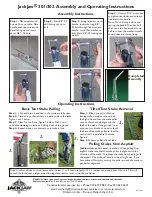
LISST-SL V2.1
User’s Guide
25
VI.
Software Installation and Viewing Data
1. Overview
Each data collection exercise produces a large number of
data files. These were described in Section 2.6. To recap,
the following files are produced:
Rxxxxxxx.TXT Text file with details of all related
files below. Contains ‘memory’ of when created,
instrument serial number, firmware version in TSB,
name of file with Concentration and Mean Size;
name of Raw Scattering data binary file; associated
background file (Z***,asc below) , and units
Zxxxxxxx.ASC Background scatter file, used for
processing
.dat
file.
Rxxxxxxx.CSV Comma-separated file, saves data
displayed on TCB during data collection. Contains
Date, Time, Depth, Velocity, Mean Size, TSS,
Temperature, Optical Transmission, Pump state (1
=ON, 0=OFF), and Battery Voltage.
Rxxxxxxx.DAT Binary data file, 50 variables per
record. See Appendix A to see order of variables
(needed if processing data in Matlab).
The
Particle Size Distribution,
which contains the 32-bin
size distributions are created , from post-processing
.dat
file through the Windows software. These Particle Size
Distribution files have the name Rxxxxxxx.psd. See
Appendix A for order of variables in the .
psd
files.
You will notice that so far, even including a field test, no
PC use was required. The Windows Software provided by
Sequoia is needed only to process the .dat binary data
file.
You will only process one file: the
.dat
file on your PC.
This is the raw binary data file. Processing this file takes
some time, hence it is done on a PC. It produces the size
distribution file,
.psd
. To process the file, you will need 2
other files: the background saved with this file, and the
ringarea file (provided with the software). The software
always needs calibration parameters of the instrument
which are included in the .
ini
file. In the next step, you will
load software on your PC.
2. Software
Installation
Load the CD supplied to you with the instrument, and
type setup when ready. The software will be installed in a
folder selected by you. Create a short-cut to the
executable program on your desktop.















































